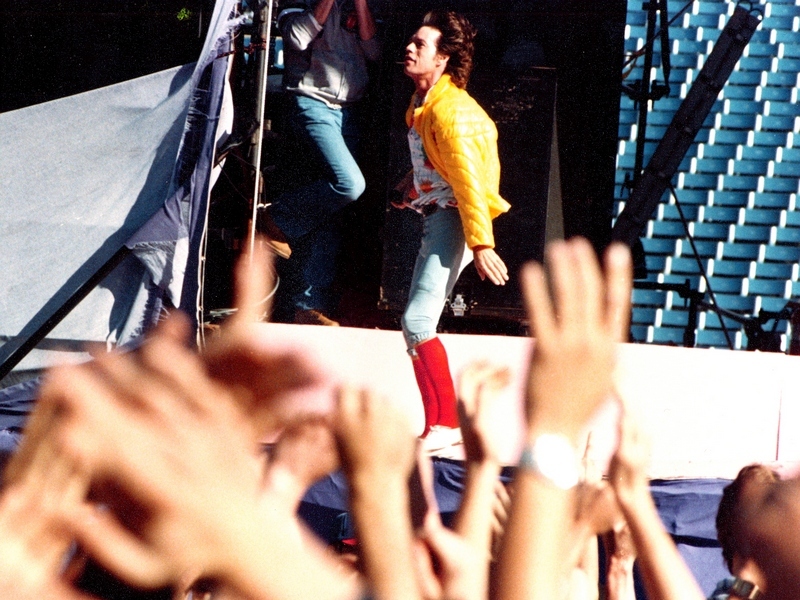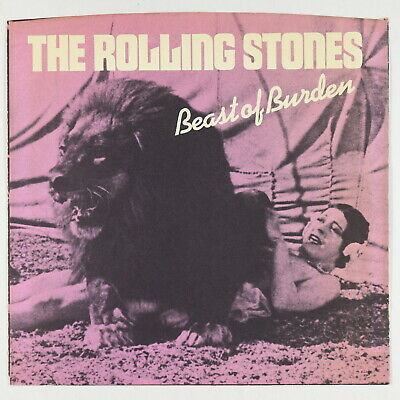
The US version of the album, originally self-titled but later officially called England's Newest Hit Makers, was the band's debut US album and was released by London Records on, a month-and-a-half after the British version. The album was only released in mono in both the UK and US no true stereo mix was ever made. The original title was also re-instated as part of the Rolling Stones in Mono CD box set, released on 30 September 2016. In November 2010, it was made available as part of a limited edition vinyl box set titled The Rolling Stones 1964–1969, and by itself digitally at the same time. The original British version of the album was released on compact disc in 1984, but became out-of-print on CD for many years afterwards. Upon its release, The Rolling Stones became one of 1964's biggest sellers in the UK, staying at No. The cover bears no title or identifying information other than the photo and the Decca logo – an "unheard of" design concept originated by manager Andrew Oldham. The album cover photo was taken by Nicholas Wright. "Route 66" is listed as "(Get Your Kicks On) Route 66" on some versions of the album, and some later versions of the album have "I Need You Baby" listed as "Mona (I Need You Baby)" and the subtitles of "Now I've Got a Witness" and "Tell Me (You're Coming Back)" removed entirely. Early labels and covers also have misprints with the fourth track on side 1 listed as "Mona", which was later changed to "I Need You Baby"", the subtitle of "Now I've Got a Witness" written "Like Uncle Gene and Uncle Phil", the word 'If' omitted from "You Can Make It If You Try", and 'Dozier' spelt 'Bozier'. Subsequent pressings include the 4:06 version. Phil Spector and Gene Pitney both contributed to the recording sessions, and are referred to as "Uncle Phil and Uncle Gene" in the subtitle of the Phelge instrumental "Now I've Got a Witness".įirst pressings of the album, with matrix numbers ending in 1A, 2A, 1B, and 2B, have a 2:52 version of "Tell Me (You're Coming Back)", which was pressed from the wrong master tape.

Two songs are credited to " Nanker Phelge" – a pseudonym the band used for group compositions from 1963 to 1965.
Beast of burden the rolling stones professional#
Mick Jagger and Keith Richards (whose professional name until 1978 omitted the "s" in his surname) were fledgling songwriters during early 1964, contributing only one original composition to the album: " Tell Me (You're Coming Back)". The majority of the tracks reflect the band's love for R&B. The album was originally released by Decca Records in the UK, while the US version appeared on the London Records label.

And in case you didn't get the memo that the Stones remain one of the strongest live acts of all time, they've included 10 tracks recorded from the road between 20, some of which feature guest appearances by Brad Paisley, Florence Welch, Ed Sheeran, and Dave Grohl.Recorded at Regent Sound Studios in London over the course of five days in January and February 1964, The Rolling Stones was produced by then-managers Andrew Loog Oldham and Eric Easton.

Aside from a few classic ballads (“Wild Horses,” “Angie”), Honk serves as a reminder of what the band built their name on: strutting rockers and barroom stompers.Īnd they run the gamut here, from beautifully swampy and chaotic ( Exile on Main St.’s brassy opener “Rocks Off,” Keith Richards’ vocal turn on that album's “Happy”) to slinky and soulful (“Miss You” and “Beast of Burden” from 1978’s Some Girls 1994’s “Love Is Strong”) to straight down the middle (1981’s “Start Me Up,” 1989’s “Rock and a Hard Place”) to straight-up covering blues artists of the ’40s and ’50s (2016’s "Just Your Fool” and "Ride ’Em On Down”). But while that timeframe is broad, the focus is stylistically tight.

Honk essentially picks up where Hot Rocks left off, plucking 36 tunes from a range of LPs starting with 1971’s Sticky Fingers and ending with 2016’s Blue & Lonesome. Four and a half decades later, there’s a whole lot more catalog to consider than what that original, unassailable run of ’60s albums offered at the time.
Beast of burden the rolling stones series#
When The Rolling Stones’ former manager Allen Klein assembled one of the band’s earliest compilation series in 19 ( Hot Rocks 1964-1971 and More Hot Rocks), he was surveying an entirely different group than the one we know today.


 0 kommentar(er)
0 kommentar(er)
